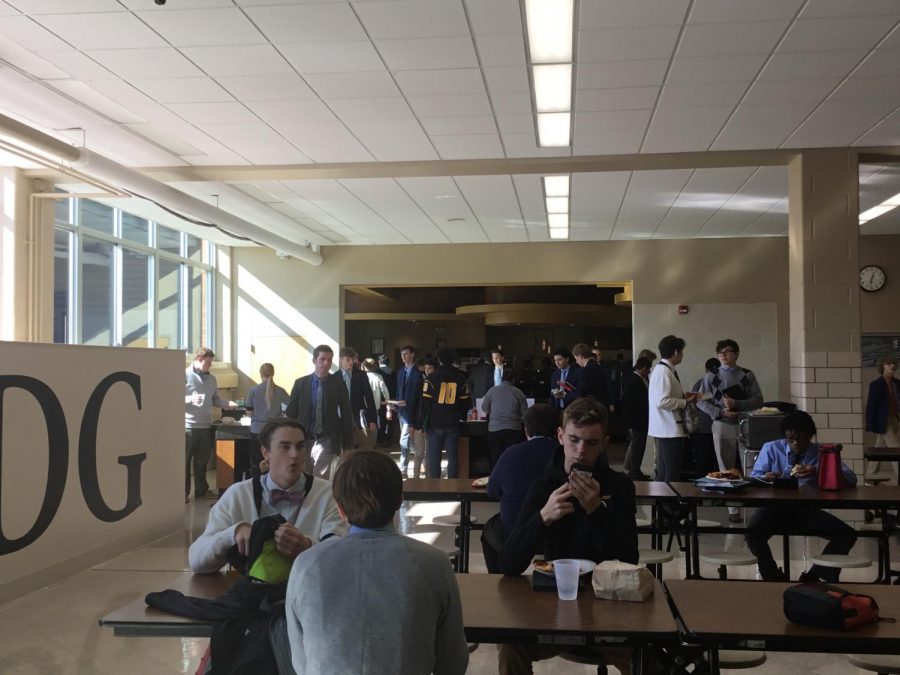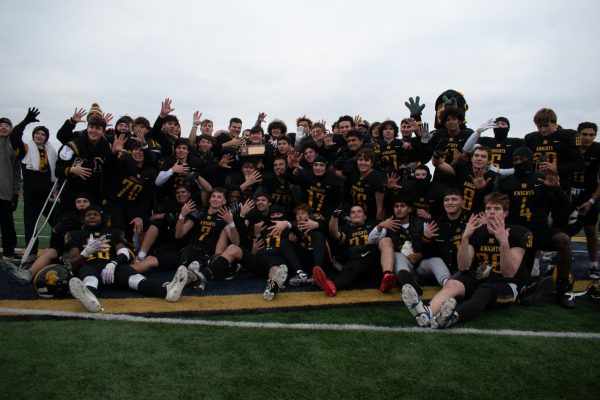McQuaid’s Transition to Lessing’s
For the first time since 2004, McQuaid Jesuit has a new cafeteria food provider.
Over the past 15 years, Sage Dining Service had been a McQuaid mainstay, but in October 2018 the administration issued a Request For Bid (RFB) to other providers.
A committee led by Mrs. Jennifer Roxstrom and consisting of administrators, teachers, and other faculty members was assembled to head the search for the next cafeteria food service, which decided in April 2019 to agree to a 3 year contract with Lessing’s.
Issuing an RFB is a common practice among businesses or other entities who employ food services. It is normally done every five to seven years; McQuaid had not done so since hiring Sage prior to the 2004-05 academic year.
The selection process was extensive, the committee taking seven months to reach a decision. Six candidates made initial bids, with this group being cut down to 3 finalists: Sage, Lessing’s, and AVI Foodsystems. Sage, however, retracted its bid due to “internal changes” that precipitated their decision to not return to McQuaid, according to Mrs. Roxstrom. That left Lessing’s and AVI as the remaining options.
The committee then completed multiple taste testings with each company, both at their facilities and in the cafeterias of schools and businesses they operated out of.
“We felt both were adequate…Ultimately we decided to go with Lessing’s because they offered the best package,” Mrs. Roxstrom said, also mentioning that Lessing’s offered a greater amount of options. Students were not involved in the selection process, nor was there any consideration to involve them, as the administration and committee felt there were decisions to be made that were inappropriate for students to be a part of, including those of a financial nature.
The transition has not gone as smoothly as hoped thus far. Many students have expressed their frustrations over the change. “The food does not have the same taste as Sage’s, and it is more expensive,” junior Emmett DeVoesick said.
Principal Adam Baber acknowledges these frustrations, saying he has heard complaints regarding taste and price. While concerns have been raised about a variety of foods, pizza is a particular point of emphasis. “Pizza is one of the biggest sellers at McQuaid. We need to get pizza right,” Mr. Baber said.
Mr. Baber also expressed a desire to institute value meals similar to those students may find at a restaurant to help remedy price increases, as well as a desire for consistency. Having certain foods available on specific days, such as Sage’s “stir fry Wednesday,” was popular among students, and Mr. Baber would like to see this concept make a return.
Mr. Blair Wilson, the cafeteria manager for Lessing’s, is confident in the direction he and his team are going in. Although he believes “a lot” of students enjoy the current product, he acknowledges that there have been initial growing pains, but he believes they will be able to adjust to the students’ needs and wants.
“It has been like that everywhere I’ve been,” Mr. Wilson said.
Mr. Wilson says he and his team have already taken and will continue to take steps to improve their product. Like Mr. Baber, Mr. Wilson believes pizza is very important. He says they have changed the dough and continue to make adjustments.
They are looking to introduce new foods, such as a burger inside of a pizza shell. This has been a popular item at Mr. Wilson’s previous stops, and he hopes to make it available soon. He also plans on bringing back the consistency that was so popular with Sage. They will soon implement “Taco Tuesday” and “Pasta Wednesday.”
This adjustment is a “trial and error” type process, with Lessing’s needing both time and information to understand and adapt to student preferences. Mr. Wilson feels this process is ongoing. He believes they are better today than they were the first day of school and they will be better a month from now than they are today.
Mr. Baber agrees with Mr. Wilson’s assessment, saying he does not have long term concerns and that, although he was not at McQuaid in 2004, he is aware of Sage going through similar “growing pains.”
“I think Lessing’s has done a good job responding to criticism so far. The food has definitely gotten better,” junior Henry Smith said.
Mr. Baber has decided to institute a “Cafeteria Council” to communicate with and advise Lessing’s. He would like to have representatives from most, if not every, grade level, as well as some faculty members, as they purchase food from the cafeteria as well. He is looking for members who will provide constructive criticism based on their experience and what they have heard from their peers.
Mr. Baber’s goal in creating this council is to allow students to give direct feedback to Lessing’s on a variety of issues. He envisions discussions about taste preferences, pricing options to accommodate students of all economic backgrounds, and increased options for students with food allergies.
Mr. Wilson is open to working with this new council. He feels it will be a good way to receive the feedback he needs to properly adjust to student wants. He is optimistic that meetings will lead to positive steps forward.






